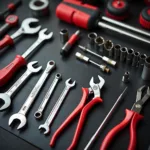A hot engine can panic any car driver. What does it mean when the engine is running hot? Is it a serious problem? This article provides you with all the important information about “engine hot,” from the most common causes to effective solutions and useful prevention tips. We explain clearly what is behind the problem and how to react correctly.
Similar to heating hot although it is off, a hot engine can have various causes.
Why is my engine getting hot?
An overheated engine is not a trivial problem and can indicate various causes. From a low coolant level to a defective thermostat to problems with the water pump or the cooling system – the reasons can be diverse. An “engine hot” condition can lead to serious engine damage if action is not taken promptly.
Common Causes of an Overheated Engine
- Coolant Loss: A low coolant level is the most common cause of an overheated engine. Leaks in the cooling system, a leaky radiator, or a defective expansion tank can lead to coolant loss.
- Defective Thermostat: The thermostat regulates the flow of coolant. A defective thermostat can block the coolant flow and lead to overheating.
- Water Pump Issues: The water pump ensures the circulation of coolant in the engine. A defective water pump can impair coolant flow and cause the engine to overheat.
- Clogged Radiator: A clogged radiator can prevent heat exchange and lead to overheating. Dirt, insects, or other deposits can clog the radiator.
- Defective Fan: The fan cools the radiator by blowing air through the cooling fins. A defective fan can impair cooling performance.
What to Do If the Engine Is Hot
- Stop Immediately: As soon as you notice that your engine is running hot, stop immediately in a safe place and turn off the engine.
- Let the Engine Cool Down: Let the engine cool down for at least 30 minutes before opening the engine compartment.
- Check Coolant Level: After cooling down, check the coolant level. Refill coolant if necessary.
- Seek Professional Help: If the problem persists, visit a workshop. “Engine hot” conditions should be checked by a professional.
As bailiff because shows, a quick reaction is crucial to avoid major damage.
Prevention: How to Avoid an Overheated Engine
- Regular Maintenance: Have your cooling system serviced regularly and check the coolant level.
- Coolant Change: Change the coolant according to the manufacturer’s specifications.
- Check Cooling System Functionality: Have the functionality of the thermostat, water pump, and fan checked regularly.
Similar Problems and Solutions
Sometimes an “engine hot” problem can be related to other systems in the vehicle. For example, a problem with the mercedes engine control unit can in rare cases also lead to overheating. It is important to consider all possibilities. Even topics like the bmw f1 team emphasize a perfectly functioning cooling system to achieve peak performance.
Conclusion: Engine Hot – Act Fast!
A hot engine is a serious problem that should be resolved as quickly as possible. Through regular maintenance and monitoring of the cooling system, you can effectively prevent “engine hot” situations and avoid costly repairs. Do not hesitate to seek professional help if you notice problems with your cooling system. Contact us via our website, we have 24/7 auto repair experts available. Share this article to help other drivers and leave your questions and comments below!

